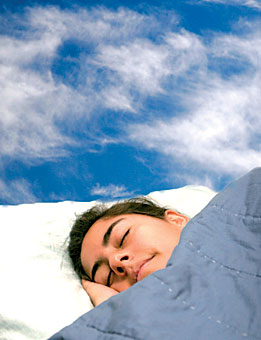 |
|
Photo illustration by Josh Fields/Arizona Daily Wildcat
|
Pre-business freshman Luz Gossmann gets some shuteye between classes in her dorm room. Dr. Stephen LaBerge was on campus yesterday evening to speak about lucid dreaming, the act of consciously perceiving and recognizing that one is dreaming while sleeping.
|
|
|
By Mika Mandelbaum
Arizona Daily Wildcat
Friday, October 21, 2005
Print this
Meditation could help fight off bad dreams, shyness
Through a state of dreaming that combines Western science and Tibetan Buddhist study, students might be able to improve sleep quality, overcome fears and explore reality.
Lucid dreaming occurs when a person is sleeping and becomes aware of the fact that they are dreaming.
Tibetan Buddhists have used lucid dreaming to perform dream yoga, where they achieve a meditative state in their sleep.
By reaching the lucid dreaming state, college students, who typically have problems sleeping, have the power to improve their sleep, said Dusana Rybarova, the director of the Dharmakirti College Research Institute, a nonprofit organization that supports interaction between scientists and Buddhist scholars.
"You can bring your sleep under control through your own will, practice and meditation," said Rybarova, a UA psychology graduate student.
For example, through lucid dreaming, a person can turn a nightmare into a transcendental, peaceful state by taking control of the situation with a positive attitude, said lucid dreams researcher Stephen LaBerge.
LaBerge has researched lucid dreams at Stanford University, proving scientifically that people have lucid dreams while sleeping.
LaBerge gave a lecture last night in the Manuel T. Pacheco Integrated Learning Center, explaining lucid dreaming and its applications.
Lucid dreams can be used for creative play, rehearsal for living, problem solving, healing and dream yoga, LaBerge said in his lecture.
In this sense, lucid dreaming is useful for students who are eager to experiment because it allows them to explore reality in a simulated way, LaBerge said.
 |
|
You could hang out all day and study at night while you're sleeping.
- Dusana Rybarova, psychology grad student
|
 |
"College students want to experiment with everything," he said. "(Dreams are) the place to experiment."
College students could also use this experimentation to help them overcome fears, anxiety or shyness, characteristics many students have when first coming to college, LaBerge said.
A dream yoga master who came to the UA last year said there is the possibility that students can learn or memorize things in their dreams, though no research has been done on this issue, Rybarova said.
"You could hang out all day and study at night while you're sleeping," Rybarova said.
LaBerge emphasized that lucid dreaming is a highly learnable skill.
"If you really want to do this, you can," he said.
Lucid dreaming can be achieved through new technologies and taking herbal substances such as those used to treat Alzheimer's or Parkinson's diseases, LaBerge said.
But ultimately, lucid dreaming will only be obtained if the person has the right mindset, LaBerge said.
It took LaBerge about three years to learn the skill of having lucid dreams at his own will.
He now teaches others techniques to develop that ability to have lucid dreams.
The Dharmakirti College also plans to offer a class on lucid dreaming in the future, Rybarova said.
Tom Prinster, a retired member of the Tucson community, said he sometimes has lucid dreams, but attended the lecture to learn more about it.
"Lucid dreams enhance my consciousness and awareness," Prinster said. "It answers the question, 'Is this it?' No, there's more."
Prinster said he would encourage anyone to learn the skill of lucid dreaming and that it would benefit society.
"I think the world is at peril of not knowing how to advance the consciousness of the average individual," Prinster said.
